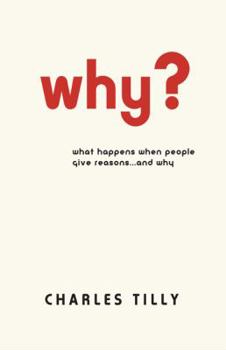Why?
Select Format
Select Condition 
Book Overview
Why? is a book about the explanations we give and how we give them--a fascinating look at the way the reasons we offer every day are dictated by, and help constitute, social relationships. Written in an easy-to-read style by distinguished social historian Charles Tilly, the book explores the manner in which people claim, establish, negotiate, repair, rework, or terminate relations with others through the reasons they give. Tilly examines a number...
Format:Hardcover
Language:English
ISBN:069112521X
ISBN13:9780691125213
Release Date:March 2006
Publisher:Princeton University Press
Length:224 Pages
Weight:0.89 lbs.
Dimensions:0.9" x 5.5" x 8.5"
Customer Reviews
1 rating
Because I said so, THAT's why!
Published by Thriftbooks.com User , 18 years ago
Did you ever justify your actions to your child by saying "because I SAID so, that's why"? Sure. But what about to your boss? I think not! The difference between these two situations is the subject of Tilly's book: the social nature of explanation and reasoning, and the way in which these processes are dependent on our social relationships. I am a psychologist researching the role of reasoning in decision-making. Often, in my field, "choice based on reasons" is characterized as a deliberate, almost mathematical process: one weights the reasons for and against a choice; if the "reasons for" are more compelling than "reasons against," one forges ahead. Our experiments admit that the weighting process can be distorted by social forces, but nevertheless the way we think about the process is fundamentally mechanical. In fact, we rather like it to be that way, since an internally consistent reasoning process would appear necessary if people are to make rational choices. Chuck Tilly's notion of reasoning is radically different than that. Tilly sees reasoning as fundamentally social; we give reasons to justify decisions TO OTHER PEOPLE; thus, who those other people are and what our relationship is to them is the driver of the kind of reasoning we provide. Tilly identifies four types of reasoning: conventions, stories, codes, and technical accounts. "Conventions" are prefab reasons designed to terminate conversation: When your soon-to-be-ex boyfriend says "it's not you, it's me," he means to close off conversation. Conventions are more likely to be offered to someone with lower status (thus, you can say "because I said so" to your kid but not your boss). "Stories" are simple narratives. Stories offer a pared-down set of explanations that result in people being the cause of their own results. (Here's a new story someone offered me today: "The McCartneys are getting divorced because Heather couldn't stand the spotlight of celebrity".) "Codes" are explanations of a legalistic nature; in effect, a code argues "we do it that way because that's the way we do it." When the gate attendant at the airport says "you can't board now because we are pre-boarding only," she is offering you a code. "Technical accounts" are the sort of highly refined, abstracted reasons that scientists or other trained specialists offer each other ("The t-statistic indicates a probability of getting this result by chance of less than 5%"). Technical accounts sometimes act as a kind of secret handshake, indicating to the recipient "I am one of you; accept my explanation." Tilly's book is short and sweet and engagingly written, loaded with entertaining examples. The only one that doesn't seem to enhance his point dominates the opening chapter: what explanations people offer for what happened on 9/11. This example is long (relative to the rest of this short book) and does not map neatly onto his later typology; it seems likely to confuse the reader ("is this a 9/





